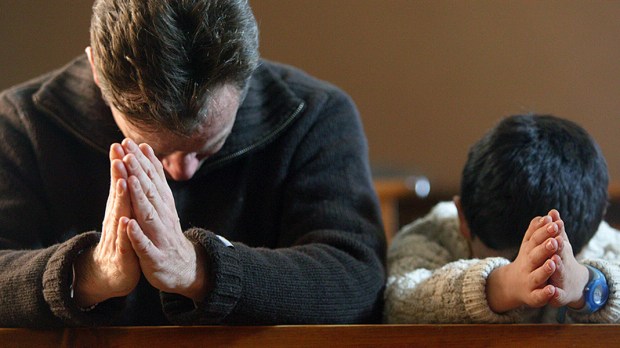Divorce is a tricky topic for Catholics: While we believe in the indissolubility of marriage, in practice many Catholics have gone through divorce. Parents who are divorced may want guidance on how to bring God into their family’s healing, and how to help their children grow closer to God throughout and after the process. For divorced Catholic parents, a new book by Lynn Cassella-Kapusinski, a licensed clinical professional counselor, may be a godsend.
Cassella-Kapusinski has personal experience as a child of divorced parents and as a counselor to many families going through divorce. Each chapter of her book, The Divorced Catholic’s Guide to Parenting, addresses a different issue parents may face, such as “helping your child adjust to a new sense of family,” “understanding divorce problems that may arise and your child’s reaction to them,” and “using the divorce as a teaching opportunity regarding the sacrament of marriage.” One chapter of special relevance to parents of faith discusses “helping your child bring God into the solution.”
Children of divorce often feel disaffiliated from church: Cassella-Kapusinski writes, “A study from the Public Religion Research Institute found that 35% of children of divorced parents are nonreligious as adults, as compared to 23% of children from intact families.” But this doesn’t mean all bad news. The impact of parents and their example on their children’s faith lives cannot be overstated. Cassella-Kapusinski writes, “A major factor not explored in this study is how the divorce impacted the parents’ spiritual and religious identities which, in turn, impacted their child.”
Modeling a strong and living faith and having ongoing and sincere conversations about religion are key to nurturing your child’s relationship with God. Cassella-Kapusinski offers these eight practical suggestions for parents to help their children find healing through faith.
1Share your faith journey with your child.
“Consider sharing experiences of God working in your life with your child,” Cassella-Kapusinski writes. Your life as a faithful Catholic is the most compelling witness. You might pray together, talk about the homily together after Mass, learn about a saint, or read a religious book or watch a religious TV program.
2Make Mass and confession a regular part of your life as a family.
Cassella-Kapusinski compares the effect of the sacraments on the soul to the effect of good nutrition, proper sleep, and exercise on the body. “We need to insist on similar, ongoing care for our children’s spiritual health and stamina, even if they refuse or put up a big fight,” she writes.
Involvement with a faith community plants seeds that eventually take root and grow. Parents can help those seeds grow by taking their children to regularly access the grace of the sacraments.
3Establish a routine family time for giving thanks to God.
The Eucharistic Prayer reminds us “always and everywhere to give [God] thanks,” but it might seem easier to focus on what’s going wrong, especially during difficult times. Taking time to regularly thank God for His ongoing blessings reminds children that God is with us and always there to help.
4Point out the good in your family members and nurture those relationships, especially regarding your child's other parent.
After a divorce, some children perceive one parent as good and one as bad, but this thought process does not help their long-term healing and peace. “These perceptions can also add further difficulty for children in relating to God as a loving Father or to Mary as a loving mother,” Cassella-Kapusinski writes. When possible, parents can point out good and kind qualities in the other parent, and encourage relationships with other loving family members as well.
5Dialogue with your child about God.
Following the divorce or separation, children may experience anger, sadness, and a range of other emotions. “Encourage your child to talk with God about this struggle,” Cassella-Kapusinski writes, and “reassure your child that God will hear him and respond with something helpful.” Some children may struggle to relate to God as a trustworthy parent, so parents may want to discuss the child’s image of God, listening to any worries or difficult emotions the child may be having.
6Do a Giving It to God activity with your child.
This project is simple but incredibly profound, giving children a concrete way to see the effects of prayer. Children are encouraged to write a note or draw a picture about issues they are struggling with, leave the note behind or under a religious image in the home, and return to read the note after a week or two while discussing what has changed since the note was written. It’s a reminder of God’s presence and unfailing help.
7Help your child learn about free will.
Cassella-Kapusinski writes that many children of divorced parents ask, “If God really loved me, why would God allow the divorce to happen to my family?” Their grief may cause them to doubt God’s goodness. Parents might explain that God gives us free will, which includes permitting bad things to happen, and that God can bring good out of bad situations. It’s also a reminder to use our free will responsibly, and choose to do good.
8Explain that trials show us how much we need God.
We need God’s help in every part of our lives, and “trials like divorce emphasize this fact,” but thankfully “the Church and her sacraments are there to give us the support we need on our journey to holiness.” Parents might talk to children about leaning on God during this difficult time, remembering that His loving aid is always available for us if we ask.
These suggestions are only a tiny part of the wisdom and experience that Cassella-Kapusinski brings to this topic. Her book is a timely, impressive, and accessible resource that, in the words of Archbishop Wilton D. Gregory, “is an answer to the calling of the whole Christian community to accompany with attention and care those who have endured the effects of divorce.”The Divorced Catholic’s Guide to Parenting is a necessary road map for that accompaniment, bringing the support and understanding that many parents have been seeking.

Read more:
7 Saints who went through divorce

Read more:
What 3 divorced moms want you to know about co-parenting after a breakup

